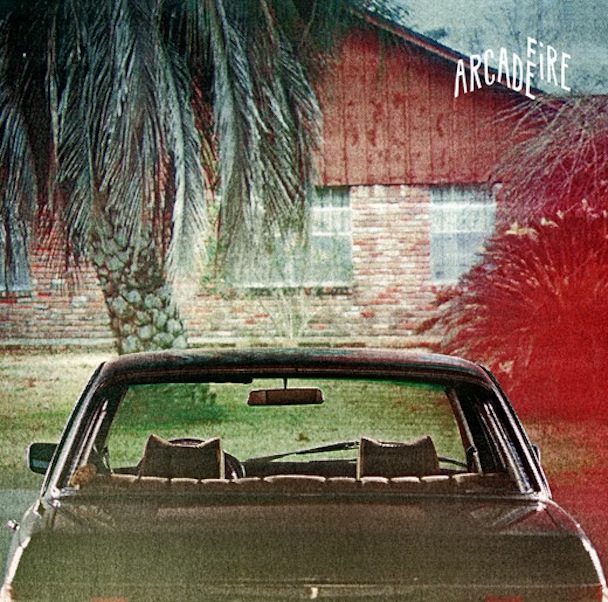ARCADE FIRE: THE SUBURBS
[rating: 5]
Arcade Fire: The Suburbs
Label: Merge Records
Release date: August 3, 2010
Here we are, at last, standing on the edge of our own manmade apocalypse. In the background is a shopping mall with a packed parking lot. There are explosions and a fierce wind whipping back and forth, yanking power lines from their war torn poles, littering the streets with dirty money from briefcases flung open, and yet no one seems to mind. Overlooking all of this is Win Butler, wife Régine Chassagne, and the Arcade Fire, burning white and serenading us all through these final, regretful-yet-complacent moments. They are playing sixteen songs from an album called The Suburbs.
To say that Arcade Fire’s third studio album evokes strong imagery is like saying the oil spill in the Gulf of Mexico is messy. It may be true, but it’s not indicative of scale. Succinctly, The Suburbs is about the spread of suburban life and, ultimately, the decay it drags along with it. The title track is reflective and speaks of the structures of past generations giving way to newer, more modern fixtures. “Half Life II (No Celebration)” eludes to the financial market collapsing. “Suburban War” addresses the evolution of cities, with Butler singing “this town’s so strange/they built it to change/and while we’re sleeping all the streets get rearranged”. And “We Used to Wait” looks back on days where we wrote personal letters and shared intimate details with friends and loved ones rather than sending robotic, emotionless e-mails or clicking “like” on a Facebook comment in lieu of actual conversation. The song, much like the theme it conveys, builds dramatically towards one final chorus. But it never actually comes, instead drifting off with Butler still urging his doomed audience to “wait for it”. It’s incredibly human. It also illustrates a huge point: sometimes taking a deep breath and showing patience is the right way to go, but there’s a sizable gap between waiting patiently and procrastinating until the moment passes and all the waiting proves to be a death knell.
The Suburbs isn’t packed with the kind of string-pulling anthems we’ve come to expect from Arcade Fire. The closest parallel to Funeral‘s “Wake Up” or Neon Bible‘s “Keep the Car Running” in terms of immensity is “Sprawl II (Mountains Beyond Mountains)”. But still there is no shortage of terrific individual tracks. However, there’s no substitute for listening to this from beginning to end, enduring the high points and slower, more drawn out moments, such as “Half Light I” or the methodical build up to the crashing wind down on “Suburban War”. The Suburbs is woven around the full experience. Without being immersed in each individual song, reflection, complaint, desire, or concession, Butler and Chassagne’s controlled whisper at the end of “The Suburbs (Continued)” — also the end of the album — isn’t going to land with the gravity it deserves.
There’s a line in that final track where Butler takes all the emotion he and Chassagne have been singing about regarding the downfall of their city and those around it, reevaluates, and makes an honest confession not to his listeners, but to himself: “if I could have it back/all the time that we wasted/I’d only waste it again”. Earlier on “Wasted Hours” he seems sure that the squandered time was a good thing, a spark for many memories. He’s nostalgic for a past where things weren’t so rushed, so aimlessly hurried. But after feeling much disgust for so long towards the stretch and atrophy of the suburban world, he becomes submissive. In the end, Butler, Chassagne, and the Arcade Fire come to realize they are just another cog in the metropolitan sprawl that has driven us to this bleak end of times. And so they finish playing those sixteen songs, set down their instruments, and join the degenerated masses in a place called The Suburbs.



